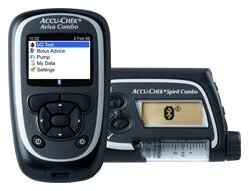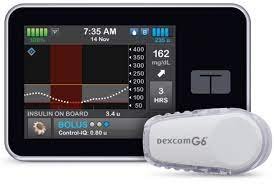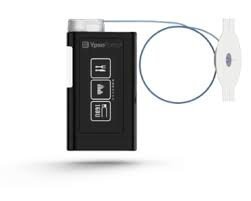I’ve been using an insulin pump since 2010, it was a difficult journey to get one, and sadly, the availability of pumps in Ireland hasn’t improved at all since. If anything the situation has gotten worse because people with diabetes are now more aware of the benefits of pumps and waiting lists are much longer. This is one of the many issues that I focus on at our Diabetes Ireland Advocacy Group meetings.
An older model insulin pump not available any longer.
I get several emails from people asking if I think that an insulin pump would be good for them and my honest answer is that it doesn’t matter what I think, a pump has to be: “The right device, at the right time, for the right person” (source #DOC).
The right device, at the right time, for the right person
I’ve also come to realise that quite a few people have very little information on what difference a pump may or may not make in their life with diabetes so I’ve gathered a couple of the suggestions and things to think about that I share with people who ask me in this blog post.
There are also excellent resources to find through online searches of “Benefits of insulin pumps”, this is one I came across recently from Beyond Type 2, “Switching from Pens to Pump”. There is also a book that I read when I was looking into an insulin pump for myself that I found extremely helpful called “Insulin Pump Therapy Demystified” by Gabrielle Kaplan-Mayer. I’ve also written a bit about my own experience of wearing and adapting to my insulin pump here and here about why I decided to be a “pumper”.
What is an insulin pump?
First, let’s not overlook an important detail - what is an insulin pump? There is an information page on Thriveabetes.ie on this very topic but it does require a bit of updating (it’s on my “to-do” list and I’m very open to suggestions :-) It is very important to know at least two things first:
An insulin pump is NOT a magic device that does all of your diabetes management for you! And,
The most common reason people shy away from pumps is because it's attached to you all of the time but many people find when they start wearing one that they forget it’s there.
Beyond the Thriveabetes webpage, there are now different types of insulin pumps (thank you DIYAPS) and at the very basic level, a pump can give you more flexibility in how much insulin you can give yourself, and the hybrid closed loop pumps can do much of this automatically.
Different types of insulin pumps
There are three types of features on insulin pumps and it’s possible that a pump will have a combination of them. There are:
Basic pump - programmed to deliver insulin at set amounts every hour. The user has to interact with the pump to dose for food, manually reduce background when appropriate.
Sensor integrated - the information from the pump and the information from the sensor can be viewed on one device or app.
Hybrid closed-loop pump or a sensor-augmented pump - the pump can receive information from a glucose sensor and give a command to adjust the insulin automatically. But the user still has to input carbohydrates and dial-up a dose of insulin for food.
An insulin pump is worn 24/7 so it’s really important that you find the one that will work the best for you and only you. So do look at what your choices are and not at what is preferred by people who do not wear them at all. Here is a list of the current insulin pumps are available in Ireland.
Should I consider an insulin pump?
Before I continue, it is very important that you do not feel pressured into a pump or that you believe you are being “left behind” if you are using insulin pens!!! 70% of people with diabetes who use insulin stay on injections because they prefer it and it works for them.
But please be curious and continue reading!
Why are you thinking about a pump?
There are a couple of questions you can ask yourself to get a better idea if an insulin pump is the right device for you. Here are some suggestions of questions to ask yourself;
Why do you want to change?
Are you struggling to prevent lots of hypos or hypers, etc, with multiple daily injections?
Are you not happy with your current time in range or HbA1c?
Or if you are happy with your current time in range or HbA1c, is the effort required leaving you completely drained and burnout?
Are you very sensitive to insulin and would benefit from micro-doses smaller than a unit or a half unit?
If the answer is yes to any of those questions, then yes, a pump may help you reduce those challenges.
Considerations in More Detail
Is your time in range less than 50-60%?
Your time in range is the average amount of time spent within your target blood glucose range. This number is easy to see on a glucose sensor but if you are using finger sticks may be provided through your meter features. Here’s some more information from DiaTribe about Time in Range.
How often are you dealing with hypos and hypers?
If you have already completed a DAFNE, BERGER or a similar intensive diabetes education and are still struggling to prevent lots of weekly hypos, or get your Hba1c below 53 mmols/ 6.5% then an insulin pump is definitely worth considering to better adjust background insulin.
Make a List
My next suggestion would be to make a list of all of your current concerns with your diabetes management and the problems you might be having. Do note some examples of those if you decide to have a conversation with your team about a pump.
For instance, for me, I could not deal with non-routine activity without snack-stacking which led to taking in extra calories when I was already struggling with my weight. So being able to reduce my background insulin an hour or two before hoovering or having to walk up to the shop or a day out with the family was a huge pump benefit.
Hopefully, this post has given you a better idea about what an insulin pump can help you with your diabetes and if it really is worth considering. The next step for anyone who has decided to explore this option more is to find out if you a) attend a diabetes clinic that initiates insulin pump starts and b) do you meet the HSE’s qualifying criteria, which you will find more information about here at Thriveabetes.ie “Getting an Insulin Pump” and here is a reminder of some of the resources in relation to insulin pumps available on Thriveabetes.ie;





